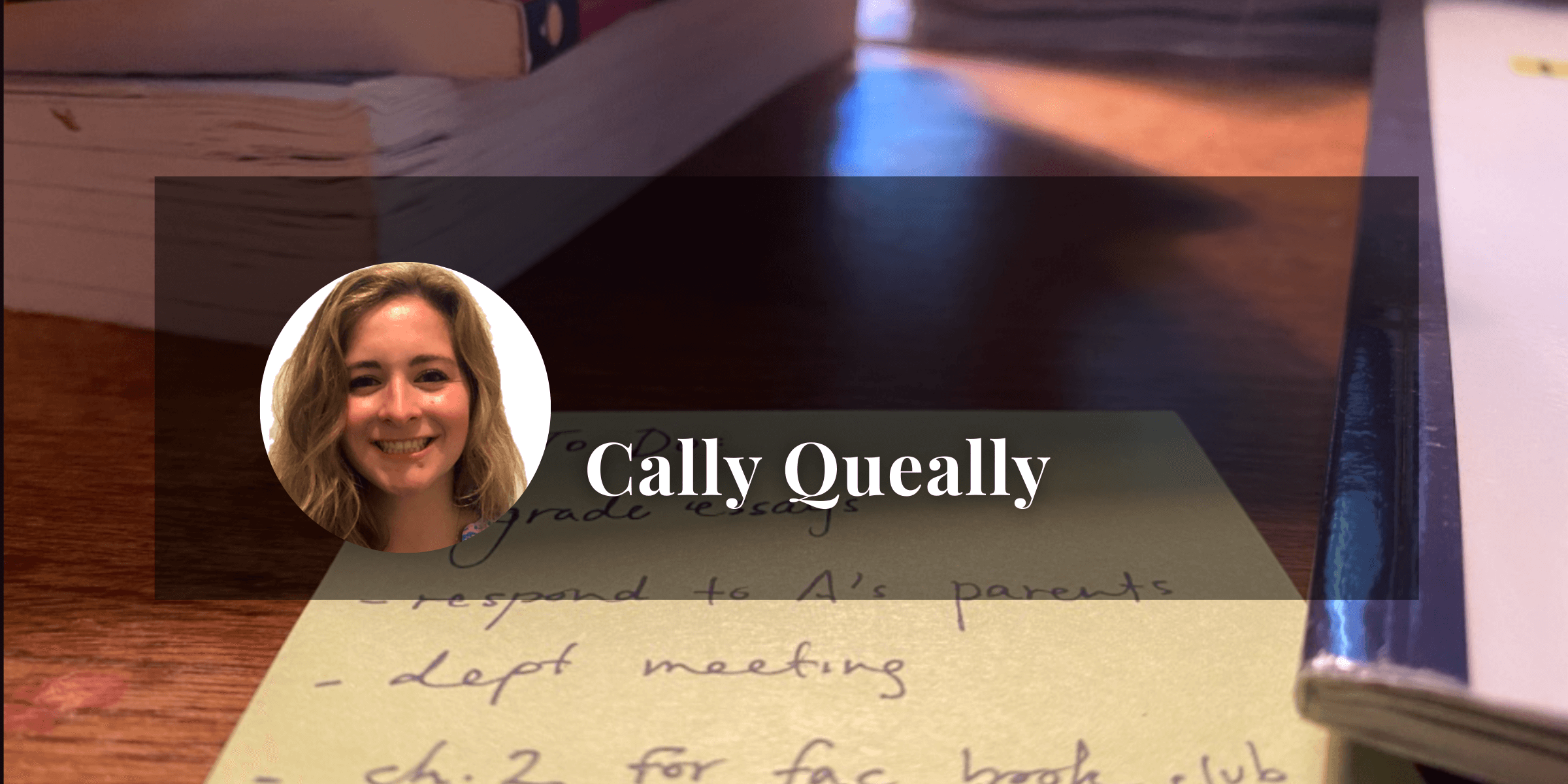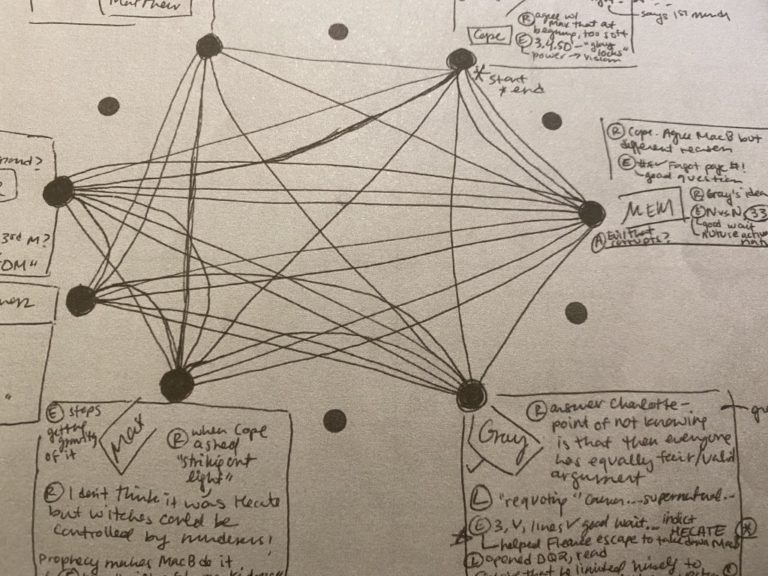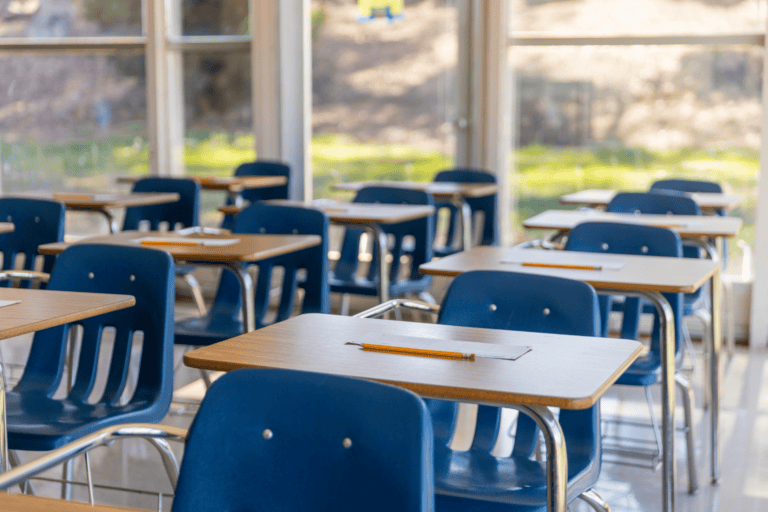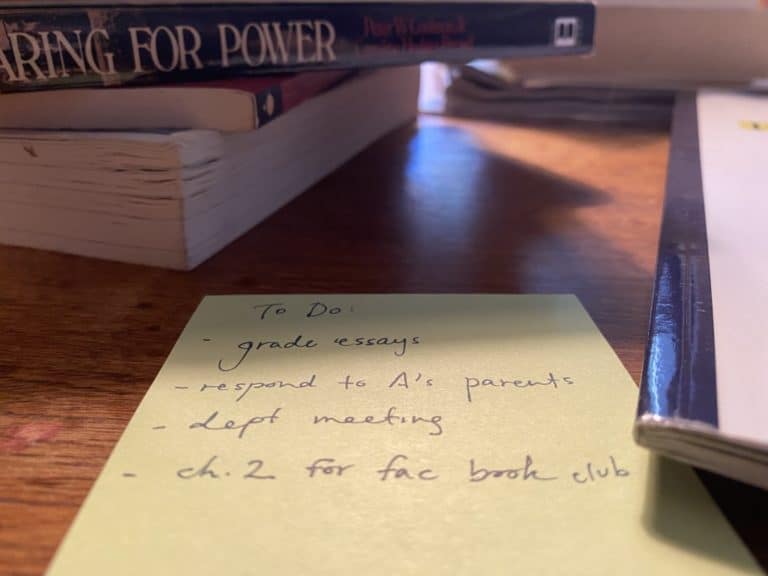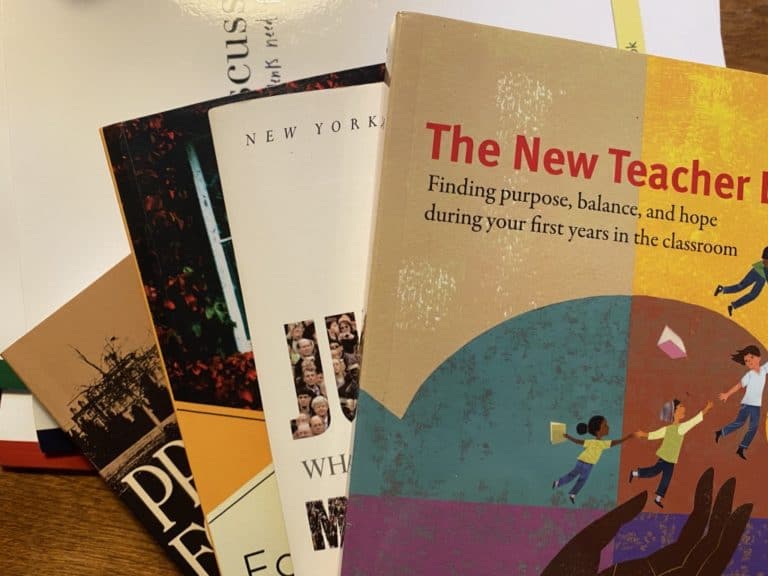Protagonists: 20 minutes with Cally Queally
The Protagonists series highlights the main characters of our mission: the teachers out there hustling to make their students feel known, heard, and challenged through student-led discussion.
Hometown My hometown is Weston, MA, which is about fifteen minutes outside Boston.
Favorite teacher growing up: who and why? I think my most favorite teacher was my theatre teacher in college (I minored in Theatre in college). She taught me Theatre of the Avant-Garde, and the energy that she had and the trust that she had for her students was amazing. I was nervous in this class — it was an elective for majors, and they all seemed much more talented than me — and for our first big assignment, she paired me with the best actress in the grade. It intimidated me and also forced me to question what makes a good student or a good actress. The experience inspired me to be more confident. I’ve kept that with me as a teacher: I want my students to feel like I believe in them and trust them, that every challenge I give them is designed to lead them to success.
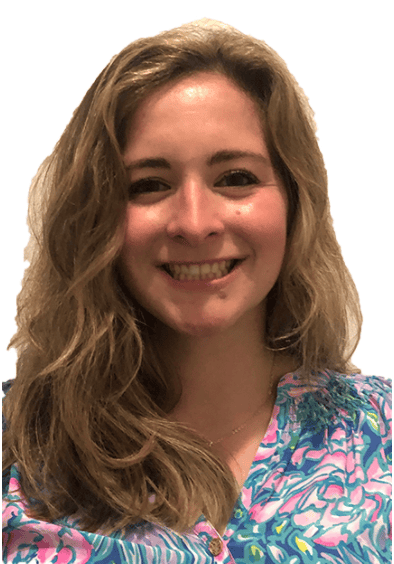
Describe yourself as a student in three words I would say driven, creative, and grade-focused. I really argued with every teacher I had over why I earned the grades I did (now, as a teacher, I laugh, because it’s so frustrating when students do this!)
Current City, School, Teaching Assignments (?) I teach at Blair Academy, a boarding school in New Jersey. I teach English II and Narrative Writing, which is an upper class elective focusing on narrative writing (it’s a creative writing course).
Favorite historical figure (or best line from history?) I feel like it’s changed. For a very long time growing up, it was the girl from Iron Jawed Angels. I liked the story of how she fought for women’s rights in England and then came back to the United States and talked back against Woodrow Wilson. Now that I’m older, I think that she was really problematic towards Black women who were looking for voting rights, and I don’t feel the same way about her. Jane Austen is a favorite for me — she took something in her life which she couldn’t have, true love, and gave it to her characters.
Favorite literary character (or best line from a novel?) Anne of Green Gables! There’s no other correct answer! She reminded me a lot of myself. She’s loquacious, tends to get over-excited, and tends to ramble. I saw myself in her and in the joy she has in everything about life. I also saw in her the parts of yourself that are hard to improve in terms of not liking criticism. The way L.M. Montgomery wrote her maturation was really inspiring. I love that she’s so realistic, so inspiring, and also has a lot of growth.
Favorite school supply? I think my favorite items, which I don’t have but that bring my students a lot of joy, are iPads. Several of my students take notes on them with a stylus, and every time a kid gets an iPad for the first time, all they want to do is show me their notes for thirty minutes. That’s incredible – for something academic to bring them joy!
Pet peeve about class (student-led?) discussion? When the kids get really excited about a tangent that takes away from the depth I’d like them to get to in discussion. Someone will raise an interesting point that isn’t focused on analysis of the material, and that’s when I feel like we’re so close to the point, but we lost that. Text-to-world points (an element of the R.E.A.L. Discussion system) can get too exciting for students, and they can lose track of the whole picture that they need to see.
Favorite moment of class discussion? When, halfway through the discussion, something is said by someone who it clicked for and then another kid replies: “I NEVER thought about that!” Suddenly everyone’s getting something really significant out of the discussion. When students can feel they’ve done the heavy lifting, it makes them feel smarter, and it makes me feel proud of their own work.
Text you count on to inspire conversation? Fairy tales! We do this very cool thing in the English II curriculum where we read through classic fairy tales — most are Eurocentric, but we also draw in tales from other parts of the world. This year, we started off with “The Little Match-Girl” in class. The way that the kids suddenly realized that 18th and 19th century fairy tales function as religious propaganda is really fun. It upsets kids’ expectations. The students expect that the unit is going to be so boring, but they connect it to sexism or the Protestant Reformation from History class, and it’s cool and unique.
What do you nerd out about? This is very specific, but I really love service dogs. A friend of mine has a service dog, and that familiarized me with laws behind service dogs and ways that you can teach the dogs to learn. It’s interesting, because I have my own (pet) dog, but I use a lot of the skills taught to service trainers in working with my own dog. It’s something that I find interesting, and rarely do people know the laws with it. It also draws people back to invisible disabilities.
What is your wish for this world? It’s hard because right now, life is so affected by Covid. My wish would be that we weren’t in the middle of a pandemic and could take learning about health and apply it to a post-pandemic world. If we weren’t here, I’d say I wish we could give younger generations more opportunities to increase their attention span. Covid has exacerbated this. People’s attention spans are shrinking: if you compare the attention span of an early 00s kid with a child now, there’s a significant difference, and I wish we could give that back.
When historians recount 2020-1, what will they be especially fascinated by? I think they’ll be fascinated by how health policies change during and after covid protocols. We often say that it takes tragedy and massive struggle for real change to occur, and I think that we are seeing real change, but I do think that people in the United States are very unaccustomed to wearing masks, whereas in other nations it’s very customary to wear a mask, especially if you’re ill. People are considering that relationship to others differently now. How the public and the world responds to people during Covid are drastically different.
One prediction for the future of schools? I have a positive and a negative. The negative prediction is that eventually there will be no in-person school. I think that so much socialization happens in school that it’s really important for emotional growth to be in school with people your own age, people around your age, and physical teachers. I took this Sociology class in college in which we learned about the difference between a school’s reputation versus its place – the reputation can be moved online. My positive prediction is that as long as we are in person, there will be a bigger focus on the emotional value of in-person learning. At Blair, there’s a huge focus on the lack of socializing over the last year and a half: how do we encourage emotional and social growth? That’s on the minds of anyone involved in education. We all know that education is not just about learning, but it’s also about growing as a person, and there’s going to be a big focus on that in the future.
Best advice given to you by a department chair or supervisor? My department chair here at Blair has been fantastic. He has a lot of helpful suggestions. The one I remember the most is just to be confident in yourself and be confident in your skills. I graduated from college in 2020. It’s hard to feel qualified to teach awesome kids. During Covid, he told me that I wouldn’t have been hired if I weren’t qualified; I should teach with confidence if I’m going to do a good job. If you’re not confident in your abilities, how can they learn?
Educator-Influencer you count on? First place you turn for classroom advice? My amazing mentor here, Kaye Evans, has been teaching for a very long time. Second, one of my closest friends in my teaching year, Pam Schulman, who also uses REAL in her History classroom. The skill she has is incredible. And then the third is the Dean of Teaching and Learning at Blair, Amanda Lucas, who has been teaching English for many years. She’s a fountain of wisdom and is always looking for ways to improve and do new things.
Better class discussions will _______________. Lead to better analysis, lead to more intrapersonal relationships, and lead to better-prepared citizens of the world in the future.
